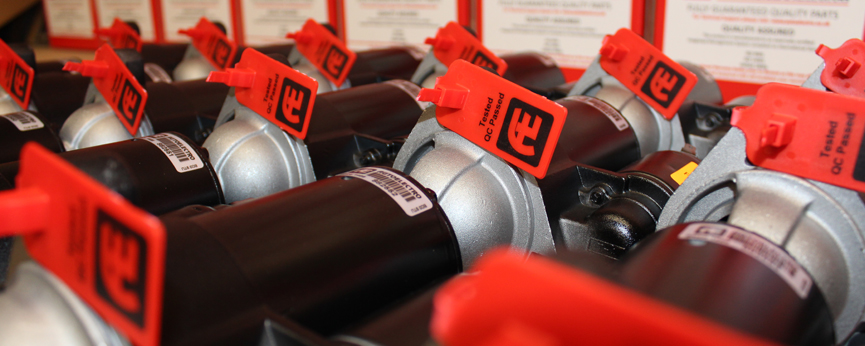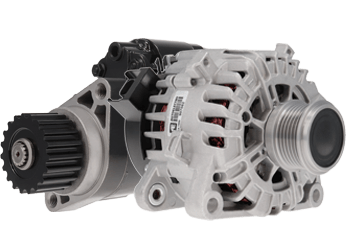A Tale of Yorkshire Grit and Determination
Santokh Singh Bhogal founded Autoelectro after quitting his job because of industrial unrest. Three decades on, the firm is still very much in the hands of the family that started it.
Bradford-based remanufacturer Autoelectro is marking thirty years in business at the moment. Like so many companies that have reached a significant number, it has engaged the services of a PR agent to make sure the world knows about it and has bought in a stack of natty red DAB radios with company branding to dish out to selected customers and suppliers.
However, we were keen to find out a bit more about the company behind the logo, so we caught up with Autoelectro Managing Director, Tony Bhogal. “The business was started by my father, Santokh who had been working for Marston Radiators when it was owned by Denso. He moved into the side for light vehicles and he said there was a good atmosphere.”

The company ran into an issue between management and the unions, which gave Santokh Bhogal a predicament. “In 1986 there had been strikes and he felt unhappy about it” said Tony. “The company had a good atmosphere, but after the industrial problems he didn’t feel the same, so he felt it was the right time to run the family business”.
Autoelectro was started from Santokh dismantling some old ACR alternators on the kitchen table, before constructing a slightly more formal workshop in the garage and the business grew from there. “Quite a few of the local garages would bring in starters and alternators just to have them repaired” explained Tony. It was quite a simple product and if you looked under he arches you’d find people doing starters, alternators, radiators, gearboxes and anything else you could think of. We were the new boys there!”
SECURITY
As you’ll read elsewhere in the issue, there was no security in just being a me-too repairer, and by the early 1990s the firm had outgrown it’s origins in a lock-up and was offering a full remanufacturing service based from an industrial unit in Bradford. Mr Bhogal Snr was joined by his sons, Tony, Paul and Nicky who all had different skill sets that complemented the business well. Tony had done a degree in mine engineering, but the mid-1980s were not a great time to enter that industry.
Paul, Autoelectro's Commercial Director, studied Business Management, so he was well suited to joining the firm at a time of expansion, while Nicky, Operations Director, qualified as an auto electrician, which had obvious benefits at a firm named Autoelectro. However, getting the product on the shelves proved to be a complex exercise.
“The motor industry was generally difficult and it was built on relationships. Rather than just saying that we had a fantastic product, well it might be a fantastic product, but it wasn’t easy getting it to the buying groups” Tony recalled. “The big break we got was in 1991 when we got approved to supply (factor and accessory shop chain) Charlie Brown. A chap called Trevor Watson was the senior buyer and I remember they had been dealing with a company who had
gone bust and they were having problems dealing with warranty and stock. So I did the presentation and they were a local company so I think it went down well”.
The call came from the chain, but the senior buyer explained that the pressure on him was to go with a large and well-known brand. “So I said to him that he is welcome to come here with a big stick and watch over us every day if he liked” said Tony with a smile. While this didn’t quite happen, a quality control auditor named Derek Lockwood was sent to spend time at the firm. He must have been impressed with what he saw, because soon after his visits the newly-bought fax machine started spewing orders. “There was page after page” recalls Tony. “They had placed an order worth £50,000. The next step for us was to find the core…”. Somehow they did, and the order was completed, thus cementing the relationship.
CHARLIE BROWNS
“On the back of Charlie Brown’s we started dealing with Motorworld so we had two of the biggest retailers throughout the UK, but these were mostly the public buying parts, rather than the trade” said Tony. “The retailers wanted to just keep a few popular part numbers rather than stock the whole range – which suited, as there wasn’t nearly as many part numbers then anyway. Then Mr. (Chris) Swan started to shake up the industry. He bought both Charlie Brown and Motorworld and although he gave us the opportunity to supply Finelist, we decided against it at the time because we weren’t happy with the terms. That caused us a few problems”.
While local trade and supply to smaller customers was brisk, the pressure was on to find new bulk supply customers. “We re-trenched and started developing our own identity and brand and developing the market further” said Tony. “At that time we started working with Delco- Remy in the USA to develop a presence in the UK. I actually met one of the senior chaps at the APRA conference in London and we started handling all of the European warranty for Delco-Remy. We’d be taking heavy non-road units such as the alternator for a Terex truck or a Caterpillar excavator that had a problem with the starter. We’d fill out a warranty report here and detail whether it was a manufacturing fault or due to abuse on the vehicle, so we were lucky at that time as Delco-Remy were expanding in the UK”.
It helped that the firm were early adopters of industrial standards. The firm was one of the first to achieve BS750 and has since gone on to earn certificates for various ISO standards as well as the ‘Green Apple’ award for sustainable manufacturing.
Not every contract was won though. Tony recalls losing out to a larger rival to become GMs official reman supplier. Nonetheless, the firm continued to expand, although it remains on the same site in Bradford where it has been since the early 1990s, which has been achieved by acquiring various adjoining buildings and connecting them together in various cunning ways. This has resulted in long walkways with doors that could lead out on to any one of a number of levels, not unlike the opening chapters of Alice’s Adventures in Wonderland.
What is interesting to see is that despite the number of nooks, corridors and corners, all of the areas are very clean and well organised. Each location has computer-based identification so that nothing gets lost. Despite running near capacity, it is clear that lean management principles are obeyed: For example, fastest moving items are nearest the door and process efficiency is constantly monitored.
On our visit Nicky Bhogal, Operations Director at Autoelectro, was busy adjusting some of the computerised test rigs, on which all of the firm’s output is checked. The rigs, custom made by D&V Electronics in Canada, are key to making sure even the newest start-stop rotating parts with built-in computing power and sensitive regulator packs are properly calibrated before leaving the plant.
Speaking of leaving the plant, it is the end of our tour and we navigate our way back through the labyrinthine maze of passages. The motor industry has changed a lot since the days of Charlie Brown’s and Finelist, but you can be sure with the right level of investment in processes and facilities, remanufacturing will remain with us for a long time yet.





